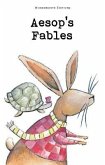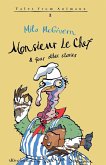Animals in Narrative Film and Television
Strange and Familiar Creatures
Herausgeber: Beeler, Karin; Beeler, Stan
Animals in Narrative Film and Television
Strange and Familiar Creatures
Herausgeber: Beeler, Karin; Beeler, Stan
- Gebundenes Buch
- Merkliste
- Auf die Merkliste
- Bewerten Bewerten
- Teilen
- Produkt teilen
- Produkterinnerung
- Produkterinnerung
This book explores fictional representations of animals in animated and live-action film and television and examines the way these representations intersect with culture, race, gender, class, disability, and health issues. Contributors analyze the narrative functions of familiar animals as well as fantastic and hybrid creatures.
Andere Kunden interessierten sich auch für
![Critical Approaches to TV and Film Set Design Critical Approaches to TV and Film Set Design]() Geraint D'ArcyCritical Approaches to TV and Film Set Design62,99 €
Geraint D'ArcyCritical Approaches to TV and Film Set Design62,99 €![Fables Fables]() AesopFables6,99 €
AesopFables6,99 €![Monsieur Le Chef Monsieur Le Chef]() Milo McGivernMonsieur Le Chef14,99 €
Milo McGivernMonsieur Le Chef14,99 €![The Birds and the Bee The Birds and the Bee]() William C O'SullivanThe Birds and the Bee11,99 €
William C O'SullivanThe Birds and the Bee11,99 €![A Surprise Party A Surprise Party]() Milo McGivernA Surprise Party14,99 €
Milo McGivernA Surprise Party14,99 €![Fables Fables]() AesopFables20,99 €
AesopFables20,99 €![The Birds and the Bee The Birds and the Bee]() William C O'SullivanThe Birds and the Bee21,99 €
William C O'SullivanThe Birds and the Bee21,99 €-
-
-
This book explores fictional representations of animals in animated and live-action film and television and examines the way these representations intersect with culture, race, gender, class, disability, and health issues. Contributors analyze the narrative functions of familiar animals as well as fantastic and hybrid creatures.
Hinweis: Dieser Artikel kann nur an eine deutsche Lieferadresse ausgeliefert werden.
Hinweis: Dieser Artikel kann nur an eine deutsche Lieferadresse ausgeliefert werden.
Produktdetails
- Produktdetails
- Verlag: Lexington Books
- Seitenzahl: 240
- Erscheinungstermin: 23. September 2022
- Englisch
- Abmessung: 235mm x 157mm x 19mm
- Gewicht: 508g
- ISBN-13: 9781666904819
- ISBN-10: 1666904813
- Artikelnr.: 64950524
- Herstellerkennzeichnung
- Libri GmbH
- Europaallee 1
- 36244 Bad Hersfeld
- gpsr@libri.de
- Verlag: Lexington Books
- Seitenzahl: 240
- Erscheinungstermin: 23. September 2022
- Englisch
- Abmessung: 235mm x 157mm x 19mm
- Gewicht: 508g
- ISBN-13: 9781666904819
- ISBN-10: 1666904813
- Artikelnr.: 64950524
- Herstellerkennzeichnung
- Libri GmbH
- Europaallee 1
- 36244 Bad Hersfeld
- gpsr@libri.de
Karin Beeler is professor in the English Department at the University of Northern British Columbia. Stan Beeler is professor emeritus of English at the University of Northern British Columbia.
Table of Contents
Introduction: Karin Beeler and Stan Beeler
Part I. Animal Characters: Racial, Ethnic, and Social Contexts
Chapter 1: "Beneath the Surface Lies the Future": Narrative,
Characterization, and the Natural World with seaQuest DSV's Darwin
Alissa Burger
Chapter 2: Ducks, Ducks and More Ducks: Comedy and Social Class in Animated
TV
David Hipple
Chapter 3:"Don't Just Fly, Soar": Reading Disability in Disney's Animation
Dumbo (1941) and Live-Action Remake Dumbo (2019)
Jessica Gibson
Chapter 4: Making the Invisible Visible: Displaced and Marginalized Animal
Characters in Samuel Fuller's White Dog and Kornél Mundruczó's White God
Heather Rolufs and Karin Beeler
Part II. Animals and Narrative Functions: Monsters/Victims/Heroes
Chapter 5: Worse than their Bite: Dogs and Horror
Catherine Pugh
Chapter 6: The Bad Habits of Rabbits: An Ecocritical Examination of Rabbits
as Antagonists in Film
MK Pinder
Chapter 7 : Of Animals and Aliens: Identifying with the Non-Human Other in
Guardians of the Galaxy
Jessica Bay and Jonathan Osborn
Part III. Animal / Human Hybrids and Other Creatures
Chapter 8: Hormone Monsters and Animal Antagonists: Animating Teen Horrors
and Promoting Eudaimonia in Big Mouth (Netflix, 2017-)
Georgia Aitaki
Chapter 9: The Transcendence of the Borders: The Animal Hero in Hosoda
Mamoru's The Boy and the Beast
Katsuya Izumi
Chapter 10: The Esperpento of Kipo and the Age of the Wonderbeasts
Sumor Ziva Sheppard
Chapter 11: (Un)learning with 'Monsters': Animals, Patriarchal Oppression,
and Ethics of Care in Guillermo del Toro's The Shape of Water
Monica Sousa
About the Contributors
Introduction: Karin Beeler and Stan Beeler
Part I. Animal Characters: Racial, Ethnic, and Social Contexts
Chapter 1: "Beneath the Surface Lies the Future": Narrative,
Characterization, and the Natural World with seaQuest DSV's Darwin
Alissa Burger
Chapter 2: Ducks, Ducks and More Ducks: Comedy and Social Class in Animated
TV
David Hipple
Chapter 3:"Don't Just Fly, Soar": Reading Disability in Disney's Animation
Dumbo (1941) and Live-Action Remake Dumbo (2019)
Jessica Gibson
Chapter 4: Making the Invisible Visible: Displaced and Marginalized Animal
Characters in Samuel Fuller's White Dog and Kornél Mundruczó's White God
Heather Rolufs and Karin Beeler
Part II. Animals and Narrative Functions: Monsters/Victims/Heroes
Chapter 5: Worse than their Bite: Dogs and Horror
Catherine Pugh
Chapter 6: The Bad Habits of Rabbits: An Ecocritical Examination of Rabbits
as Antagonists in Film
MK Pinder
Chapter 7 : Of Animals and Aliens: Identifying with the Non-Human Other in
Guardians of the Galaxy
Jessica Bay and Jonathan Osborn
Part III. Animal / Human Hybrids and Other Creatures
Chapter 8: Hormone Monsters and Animal Antagonists: Animating Teen Horrors
and Promoting Eudaimonia in Big Mouth (Netflix, 2017-)
Georgia Aitaki
Chapter 9: The Transcendence of the Borders: The Animal Hero in Hosoda
Mamoru's The Boy and the Beast
Katsuya Izumi
Chapter 10: The Esperpento of Kipo and the Age of the Wonderbeasts
Sumor Ziva Sheppard
Chapter 11: (Un)learning with 'Monsters': Animals, Patriarchal Oppression,
and Ethics of Care in Guillermo del Toro's The Shape of Water
Monica Sousa
About the Contributors
Table of Contents
Introduction: Karin Beeler and Stan Beeler
Part I. Animal Characters: Racial, Ethnic, and Social Contexts
Chapter 1: "Beneath the Surface Lies the Future": Narrative,
Characterization, and the Natural World with seaQuest DSV's Darwin
Alissa Burger
Chapter 2: Ducks, Ducks and More Ducks: Comedy and Social Class in Animated
TV
David Hipple
Chapter 3:"Don't Just Fly, Soar": Reading Disability in Disney's Animation
Dumbo (1941) and Live-Action Remake Dumbo (2019)
Jessica Gibson
Chapter 4: Making the Invisible Visible: Displaced and Marginalized Animal
Characters in Samuel Fuller's White Dog and Kornél Mundruczó's White God
Heather Rolufs and Karin Beeler
Part II. Animals and Narrative Functions: Monsters/Victims/Heroes
Chapter 5: Worse than their Bite: Dogs and Horror
Catherine Pugh
Chapter 6: The Bad Habits of Rabbits: An Ecocritical Examination of Rabbits
as Antagonists in Film
MK Pinder
Chapter 7 : Of Animals and Aliens: Identifying with the Non-Human Other in
Guardians of the Galaxy
Jessica Bay and Jonathan Osborn
Part III. Animal / Human Hybrids and Other Creatures
Chapter 8: Hormone Monsters and Animal Antagonists: Animating Teen Horrors
and Promoting Eudaimonia in Big Mouth (Netflix, 2017-)
Georgia Aitaki
Chapter 9: The Transcendence of the Borders: The Animal Hero in Hosoda
Mamoru's The Boy and the Beast
Katsuya Izumi
Chapter 10: The Esperpento of Kipo and the Age of the Wonderbeasts
Sumor Ziva Sheppard
Chapter 11: (Un)learning with 'Monsters': Animals, Patriarchal Oppression,
and Ethics of Care in Guillermo del Toro's The Shape of Water
Monica Sousa
About the Contributors
Introduction: Karin Beeler and Stan Beeler
Part I. Animal Characters: Racial, Ethnic, and Social Contexts
Chapter 1: "Beneath the Surface Lies the Future": Narrative,
Characterization, and the Natural World with seaQuest DSV's Darwin
Alissa Burger
Chapter 2: Ducks, Ducks and More Ducks: Comedy and Social Class in Animated
TV
David Hipple
Chapter 3:"Don't Just Fly, Soar": Reading Disability in Disney's Animation
Dumbo (1941) and Live-Action Remake Dumbo (2019)
Jessica Gibson
Chapter 4: Making the Invisible Visible: Displaced and Marginalized Animal
Characters in Samuel Fuller's White Dog and Kornél Mundruczó's White God
Heather Rolufs and Karin Beeler
Part II. Animals and Narrative Functions: Monsters/Victims/Heroes
Chapter 5: Worse than their Bite: Dogs and Horror
Catherine Pugh
Chapter 6: The Bad Habits of Rabbits: An Ecocritical Examination of Rabbits
as Antagonists in Film
MK Pinder
Chapter 7 : Of Animals and Aliens: Identifying with the Non-Human Other in
Guardians of the Galaxy
Jessica Bay and Jonathan Osborn
Part III. Animal / Human Hybrids and Other Creatures
Chapter 8: Hormone Monsters and Animal Antagonists: Animating Teen Horrors
and Promoting Eudaimonia in Big Mouth (Netflix, 2017-)
Georgia Aitaki
Chapter 9: The Transcendence of the Borders: The Animal Hero in Hosoda
Mamoru's The Boy and the Beast
Katsuya Izumi
Chapter 10: The Esperpento of Kipo and the Age of the Wonderbeasts
Sumor Ziva Sheppard
Chapter 11: (Un)learning with 'Monsters': Animals, Patriarchal Oppression,
and Ethics of Care in Guillermo del Toro's The Shape of Water
Monica Sousa
About the Contributors








